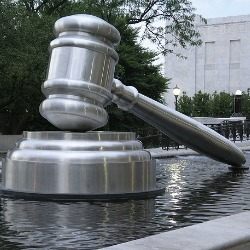BROOKE GLADSTONE: At the top of the show, we heard Law Professor Geoff Stone suggest that there was very little chance that the aiding the enemy charge against Manning would prevail. But, if it did, Harvard Law Professor Yochai Benkler says it would set a very dangerous precedent.
PROF. YOCHAI BENKLER: The judge asked the prosecutor point blank, would you have prosecuted in the same way had Manning leaked to the New York Times. And the answer was a very crisp, yes, ma’am. So there's no question that the prosecution's theory applies every bit as much to a leak to traditional media, as it does to WikiLeaks. That's what so dangerous about it.
BROOKE GLADSTONE: Elucidate what that danger is.
PROF. YOCHAI BENKLER: Here's the basic theory the prosecution has on the case: There are classified documents, classified because revealing them to the public might cause risk to personnel, to operations. Therefore, whoever releases them is aiding the enemy. So this means that every time you leak a national security document to any medium that can be accessed over the Net from everywhere, you are indirectly communicating with the enemy.
BROOKE GLADSTONE: Why would the government pursue that charge, while the administration is already on the record as saying they won't actually seek the death penalty?
PROF. YOCHAI BENKLER: I think the effect of finding Bradley Manning guilty of aiding the enemy would be to simply terrorize future whistleblowers. Imagine you’re a whistleblower. You go to a lawyer and you say, here's what I'm thinking of doing. The lawyer has to think defensively for you. The lawyer has to look up this precedent and say, is this something that could be read by the enemy and help them, if it's published online? And if the answer to that is yes, then a reasonable competent lawyer will have to say, I don't know how likely it is but you really are risking this capital offense.
We depend on whistleblowers in order to expose corruption, in order to expose malfeasance, in order to expose stupidity. Do we really want them to have to worry about whether they will face a capital offense? I think that's much too high a price to ask them to pay for our benefit.
BROOKE GLADSTONE: Now, you might have been called to testify that Manning would have been reasonable in equating WikiLeaks with the New York Times as similar journalistic enterprises. Now that argument appears to be moot. You think it won’t come up in the trial now?
PROF. YOCHAI BENKLER: The judge still will permit the testimony and, therefore, I likely will testify and will have to go over that particular question.
BROOKE GLADSTONE: How would you argue that WikiLeaks and the New York Times are similar organizations and, therefore, deserving of the same freedom of the press from the court?
PROF. YOCHAI BENKLER: I think it's very hard from the perspective of early 2013 to capture the way the world saw WikiLeaks in early 2010. You have to read every single newspaper story that talked about WikiLeaks from the moment it was founded. And the image that you see is very clearly of an active aggressive journalistic organization, exposing corruption and violence in Africa, showing how a Swiss bank uses Cayman Islands accounts to let rich clients not pay taxes, showing how pharmaceutical companies have influence within the World Health Organization and policy-setting, more probably in the family of ProPublica or the Bureau of Investigative Journalism in the UK, than just a blog or even something like Huffington Post or the Daily Beast.
BROOKE GLADSTONE: I have to take exception here a little bit, Yochai cause although WikiLeaks has exposed much malfeasance, Julian Assange himself said, to us, that they applied no editorial judgment.
JULIAN ASSANGE: WikiLeaks is not a normal news organization. We are a public service for whistleblowers who are trying to get their messages out. Our judgment would be a form of censorship of those whistleblowers.
PROF. YOCHAI BENKLER: There was a lot of “anything goes” very early on, just around late 2006, early 2007. Then, as the organization began to actually function, you saw an emphasis on verification of authenticity, selectivity in what came up…
BROOKE GLADSTONE: So it evolved from its original philosophy.
PROF. YOCHAI BENKLER: Very quickly.
BROOKE GLADSTONE: In your New Republic piece you invoke the old legal adage that hard cases make bad law. What do you mean by that?
PROF. YOCHAI BENKLER: This is a hard case because WikiLeaks is very different in its editorial structure and organization than the New York Times. And that mixture of disclosures about the United States and the portrayal of Assange at a personal level lead to a media narrative that emphasizes the irresponsibility and danger of WikiLeaks, so it's relatively easy to say, well, this is an unusual case. It’s a soldier, not a civilian. It’s hundreds of thousands of documents, not fifteen. All of these things will lead the judge to say, in this case, we will hold that aiding the enemy applies. The problem is that once you make the decision, the precedent is set. And once the precedent is set, it takes on a life of its own.
[MUSIC UP & UNDER]
BROOKE GLADSTONE: Yochai, thank you very much.
PROF. YOCHAI BENKLER: Thank you.
BROOKE GLADSTONE: Yochai Benkler is a Harvard law professor and also faculty co-director of the Berkman Center for Internet and Society.
